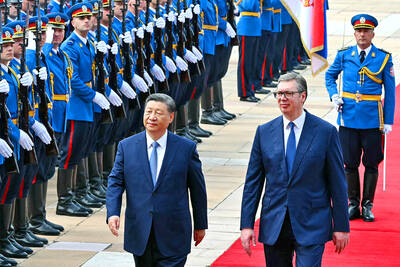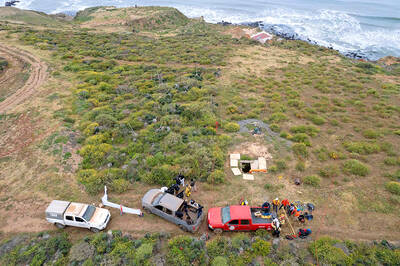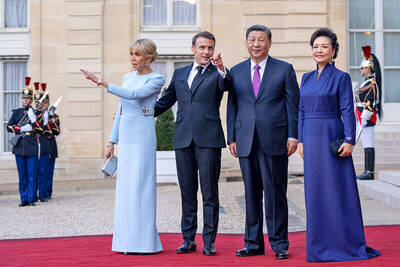Relax, eat out and shop.
That is the latest message from the Chinese government to its people, after months of warning them to stay indoors because of the COVID-19 outbreak.
In a bid to jump-start consumption that all but disappeared during the outbreak, authorities in some areas are distributing vouchers, asking companies to give people paid time off and offering subsidies on larger purchases, such as automobiles.

Photo: Reuters
Domestic media are playing up stories of officials venturing out to enjoy local delights such as bubble tea, hot pot and pork buns, but many Chinese are still hesitant to return to their old lives.
They are worried about whether it is safe to go outside and financial pressures, as unemployment spikes.
The lukewarm response to the consumption campaign is a cautionary tale for governments around the world who are hoping for a quick recovery once lockdowns are lifted.
The hurdles China faces are likely to arise elsewhere.
“China’s consumer recovery will shed some light on what may happen in the rest of the world as the outbreak eventually peaks and recedes,” Fidelity International head of equities research Ned Salter said in a client note yesterday. “There are clear signs of recovery across segments, although the pace of normalization is somewhat slow. We need to see more consumer confidence to sustain the improvement.”
In Zhejiang, companies have been encouraged to give employees an extra half-day of paid leave once a week in the hope they would use the free time to shop and spend.
Chen Xin, an interior designer based in the province’s capital, Hangzhou, will not benefit from the measure. She works for a small company of 20 people that cannot afford it after losing business because of the outbreak.
“I would be grateful just to keep my job,” Chen said. “For my colleagues and I, we are still eating at home as much as possible. Going to public places doesn’t feel safe.”
Images of bureaucrats dining out and shopping are a sharp departure from the austerity that resulted from an unprecedented corruption crackdown by Chinese President Xi Jinping (習近平), which made many officials scared to be caught doing anything that could be construed as ostentatious.
China needs to get the world’s biggest consumer market spending again now that it says the outbreak has been contained.
Retail sales plunged 20.5 percent in the first two months of this year and almost half of China’s listed retailers do not have enough cash to survive another six months.
While the Chinese Ministry of Commerce on Thursday last week said that retail sales have stopped falling, the recovery is fragile, with the economy already facing a second blow from a drop in overseas demand and many people out of jobs or having their wages cut.
Aside from a broad directive issued by China’s top economic planner on March 13, Beijing has not announced any specific measures to boost consumption.
The task has largely been left to local governments, who have to convince their residents to leave their homes and spend.
In Nanjing, municipal leaders took off their masks and had a meal of the city’s signature dish, “duck blood noodles.”
The government also issued US$45 million of vouchers to spend on items such as electronic gadgets, or sports and tourism activities.
Lawyer Lan Tianbin said that the officials’ outing was a strong signal that the recovery is underway, but he would still think twice before making any purchases that cost more than 10,000 yuan (US$1,410).
“I just landed my first case in months a few days ago,” Lan said. “It will take some time before more people can embrace this reassuring message and put aside their fears about safety, after being on edge about the coronavirus for over two months.”
Many in China have been banking on pent-up demand they hoped would be unleashed once restrictions were eased, so much so that “revenge spending” has become a buzzword on social media.
The revival on the ground has been more tepid, prompting a Chinese economist to call for more direct stimulus, such as the cash handouts employed by Hong Kong.
“We believe that the most direct way to stimulate consumption potential is to subsidize low-income groups through tax cuts and subsidies,” Peking University Guanghua School of Management dean Liu Qiao (劉俏) wrote.
The local government should also give 1,000 yuan each to the entire working population of Hubei Province, the epicenter of the outbreak, he said.
“The stimulus packages from local governments are not enough,” Economist Intelligence Unit analyst Wang Dan (王丹) said.
The unemployment rate could go up another 5 percentage points from the record 6.2 percent recorded in February, meaning another 22 million jobs lost, she said.
Hubei Province last week eased the mass quarantine that has been in place since late January and plans to do the same in the province’s capital, Wuhan, on Wednesday next week in a show of confidence that the coronavirus threat has been neutralized.
Yet residents are still cautious, with Chinese media outlet Caixin reporting that unrecorded cases are still being found daily.
Hefei, a city in neighboring Anhui Province, lifted its restrictions on dining out two weeks ago, but restaurant owner Wang Jie has not seen many customers come in for his lamb soup.
“The psychological impact will remain,” Wang said. “I don’t think people will go out to eat as often as before.”

MONEY MATTERS: Xi was to highlight projects such as a new high-speed railway between Belgrade and Budapest, as Serbia is entirely open to Chinese trade and investment Serbian President Aleksandar Vucic yesterday said that “Taiwan is China” as he made a speech welcoming Chinese President Xi Jinping (習近平) to Belgrade, state broadcaster Radio Television of Serbia (RTS) said. “We have a clear and simple position regarding Chinese territorial integrity,” he told a crowd outside the government offices while Xi applauded him. “Yes, Taiwan is China.” Xi landed in Belgrade on Tuesday night on the second leg of his European tour, and was greeted by Vucic and most government ministers. Xi had just completed a two-day trip to France, where he held talks with French President Emmanuel Macron as the

With the midday sun blazing, an experimental orange and white F-16 fighter jet launched with a familiar roar that is a hallmark of US airpower, but the aerial combat that followed was unlike any other: This F-16 was controlled by artificial intelligence (AI), not a human pilot, and riding in the front seat was US Secretary of the Air Force Frank Kendall. AI marks one of the biggest advances in military aviation since the introduction of stealth in the early 1990s, and the US Air Force has aggressively leaned in. Even though the technology is not fully developed, the service is planning

INTERNATIONAL PROBE: Australian and US authorities were helping coordinate the investigation of the case, which follows the 2015 murder of Australian surfers in Mexico Three bodies were found in Mexico’s Baja California state, the FBI said on Friday, days after two Australians and an American went missing during a surfing trip in an area hit by cartel violence. Authorities used a pulley system to hoist what appeared to be lifeless bodies covered in mud from a shaft on a cliff high above the Pacific. “We confirm there were three individuals found deceased in Santo Tomas, Baja California,” a statement from the FBI’s office in San Diego, California, said without providing the identities of the victims. Australian brothers Jake and Callum Robinson and their American friend Jack Carter

CUSTOMS DUTIES: France’s cognac industry was closely watching the talks, fearing that an anti-dumping investigation opened by China is retaliation for trade tensions French President Emmanuel Macron yesterday hosted Chinese President Xi Jinping (習近平) at one of his beloved childhood haunts in the Pyrenees, seeking to press a message to Beijing not to support Russia’s war against Ukraine and to accept fairer trade. The first day of Xi’s state visit to France, his first to Europe since 2019, saw respectful, but sometimes robust exchanges between the two men during a succession of talks on Monday. Macron, joined initially by EU Commission President Ursula von der Leyen, urged Xi not to allow the export of any technology that could be used by Russia in its invasion